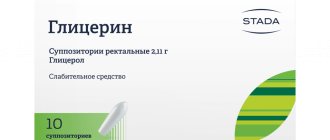After childbirth, many women experience constipation. Problems with bowel movements during breastfeeding (BF) arise for various reasons. Often difficulties are associated with changes in hormonal levels, weakening of the perineal muscles, decreased muscle tone of the peritoneum, lack of physical activity, as well as an unstable mental state after the birth of a child.
How constipation manifests itself
Constipation is defined as difficult, unsystematic or incomplete bowel movements, as well as the inability to go to the toilet for more than a day and a half in a row. The following signs indicate constipation:
- hard, dry, segmented stool;
- decrease in daily stool volume;
- decreased frequency of bowel movements (less than three times a week);
- a feeling of pressure in the rectum during bowel movements.
Constipation is often accompanied by a feeling of heaviness in the stomach and flatulence. A woman often experiences pain in the intestinal area.
When breastfeeding, spastic and atonic constipation may occur.
- Spastic . They occur against a background of nervous tension, stress, fear, or lack of sleep. Due to the nervous shock a woman experiences, the intestinal muscles contract and impede the passage of feces. Spastic constipation is characterized by frequent false urges to defecate. The stool is dry and scanty. Bowel movements are often painful.
- Atonic . Associated with inhibition of intestinal muscle tone. Insufficient peristalsis slows down the speed of stool movement. Stool with atonic constipation has a different consistency: hard at the very beginning of defecation and liquid at the end.
Problems with bowel movements after childbirth are considered normal. In most cases, constipation goes away on its own within a few days. If constipation becomes chronic, causes severe discomfort and is accompanied by unpleasant sensations, it is necessary to identify the cause of its occurrence.
Rules for using glycerin suppositories
In order for the candles to work, you must follow certain rules of use. Only after this do suppositories have a therapeutic effect and the expected positive effect of therapy appears:
- Suppositories are not used as a means for every day. Otherwise, the body gets used to it, which leads to a lack of positive effect.
- During pregnancy, women are allowed to use glycerin suppositories, but they are recommended only by an observing doctor based on the diagnosis. An incorrect dosage in such a situation provokes an increase in the tone of the uterus, which leads to a possible miscarriage, frozen pregnancy or premature birth.
- The drug can be used by children starting from 2 years of age. If there are indications, infants are allowed to administer the medicine, but treatment must take place in a hospital, under the supervision of the attending physician.
- During the acute course of the disease and the hemorrhoids falling out, the use of suppositories is prohibited. Also, you should not experiment with health and administer suppositories if there are internal cracks and an ongoing inflammatory process on the walls of the colon. It is strictly forbidden to carry out the treatment process for developing cancerous tumors in the intestinal area.
- It is better to refuse use when the patient experiences painful discomfort, burning in the rectum and anus.
We recommend watching a video with the rules for using rectal suppositories:
With prolonged use, the patient develops irritation on the walls of the rectum, which leads to pain during bowel movements. In such a situation, loose stools tend to occur. In rare cases, the occurrence of catarrhal proctitis is recorded.
It is recommended to administer the drug in the morning, immediately after meals, for 15-20 minutes.
The procedure should not be carried out right before leaving home for work. This is due to the fact that the candle will gradually begin to melt and a greasy stain will appear on the clothes in the most inappropriate place.
To install a glycerin suppository, you need to open the package and remove 1 suppository. Use the sharp end to direct the medicine into the anus and push the suppository as deep as possible.
Constipation symptoms
Constipation during breastfeeding can be accompanied by a number of symptoms. Even daily bowel movement, in which there is insufficient volume and dense consistency of stool, is considered constipation. Especially in cases where the condition is accompanied by abdominal pain, bloating, a feeling of heaviness, and a general deterioration in well-being.
Very often, constipation is combined with proctological diseases, if we talk about the postpartum period. Therefore, blood appears in the stool, associated with an anal fissure or exacerbation of hemorrhoids. This should be alarming. It is important to consult a doctor in a timely manner to receive qualified assistance.
Constipation leads to intoxication of the body, which can be manifested by the following symptoms:
- general malaise, fatigue;
- sleep disorders;
- decreased appetite;
- nausea;
- vomit;
- increased sweating;
- dizziness;
- headache.
In some cases, there is a slight increase in body temperature. Abdominal pain can occur in different parts of the abdomen: in the lower abdomen, in the right or left side, and even in the epigastric region. In cases where there is prolonged constipation, general health deteriorates greatly. Stool retention often leads to a longer recovery after natural childbirth and interferes with the healing of sutures after a cesarean section or episiotomy.
Constipation during breastfeeding in a mother often leads to sleep disturbances, increased irritability and other changes in the psycho-emotional sphere. And the general vulnerability of women in this difficult period obliges us to pay special attention to such a delicate problem.
Causes of constipation
The enlarged uterus during pregnancy displaces the pelvic organs, including the rectum. As a result, the peristalsis of the latter decreases, that is, the intestine begins to contract worse. In addition, during lactation the hormone progesterone is produced, which suppresses intestinal motility and has a relaxing effect. Other causes leading to constipation include:
- lack of plant fiber (fiber) in the diet;
- endocrine disorders, metabolic disorders;
- insufficient fluid intake;
- sedentary lifestyle and stress.
In addition, constipation during breastfeeding is often associated with hemorrhoids that appeared or worsened after childbirth. Problems with stool also appear due to the fact that the young mother’s menu does not have enough products containing coarse fibers and fiber.
Constipation after childbirth during breastfeeding can be psychogenic, that is, associated with conscious inhibition of the natural urge to defecate. Many women who have had an episiotomy or cesarean section are afraid of going to the toilet. If the doctor observing the patient after childbirth does not check whether spontaneous regular bowel movements have appeared, a serious problem with bowel movement appears by the time she is discharged from the maternity hospital.
Reviews
Tatyana, 29 years old I developed hemorrhoids during pregnancy. As the doctor explained to me, the uterus was increasing in size and putting pressure on the intestines. The stool became irregular. The doctor prescribed me glycerin suppositories. The specialist assured me that the product is absolutely harmless and safe. I inserted suppositories into the rectum, and within twenty minutes the urge to defecate arose. I'm pleased with the result. After giving birth, the problem went away on its own.
Yulia, 49 years old I have been living with hemorrhoids for a long time. I was constantly tormented by pain, burning, itching, and bumps fell out. On top of that, I have chronic constipation, which constantly makes it worse. The doctor prescribed me glycerin suppositories for rectal administration. The stool immediately returned to normal, and within fifteen minutes I had a bowel movement. From the instructions, I learned that the drug is non-toxic and the active ingredients are not absorbed into the blood. The result was not long in coming, I recommend it to everyone!
Tatyana, 36 years old I have chronic hemorrhoids. When the disease worsened, problems with stool arose. The doctor recommended glycerin suppositories with a laxative effect. It didn't take much time to achieve the result. Within a week, the inflammatory reaction subsided and the stool returned to normal.
To summarize, we can say with confidence that glycerin suppositories are an effective and safe remedy for hemorrhoids. They are simple and easy to use and are distinguished by the mobility of their therapeutic action. The product has an antimicrobial and antiseptic effect, softens feces and promotes their rapid removal from the intestines. Suppositories have a number of limitations and side effects, so before use, carefully read the instructions and do not self-medicate.
Why is constipation dangerous during breastfeeding?
Deterioration of intestinal function negatively affects a woman’s physical condition. Bloating and heaviness appear in the abdomen, and appetite decreases. Constipation may cause sleep disturbances, headaches, increased nervousness and decreased performance.
In addition, with constipation during lactation, fewer digestive enzymes enter breast milk, which also affects the baby’s stool. In some cases, delayed bowel movements can cause a reduction in breast milk production.
To normalize intestinal function, it is necessary to reconsider the daily diet and physical activity regime.
How quickly does a glycerin suppository work?
Glycerin suppositories for rectal use have proven themselves as a fast-acting cure for hemorrhoids, also helping with constipation of various types.
It is problematic to determine how quickly the suppository acts on the patient’s body. This period depends on the individual reaction of the body to the active substance and the dosage administered during treatment.
Doctors, based on practice, note that most often the effect of glycerin suppositories is detected approximately ½ hour after administration of the medicine. If there is a need to enhance the effect or provoke an acceleration of the effect, then you can increase the input rate by 1.5-2 times.
We recommend watching a video about the action of a glycerin suppository:
Treatment of constipation in nursing mothers
Not all pharmaceutical products are suitable for nursing mothers. To choose medications, it is best to consult a doctor. The specialist may prescribe microenemas, rectal suppositories or oral medications.
But most medications can only be used for a short time. Other methods will help normalize stool during breastfeeding.
The doctor's first recommendation for treating constipation during breastfeeding is a balanced diet. Laxatives are prescribed when measures to correct the diet are ineffective or there is a high risk of complications, in cases where constipation requires emergency help.
There is one most important principle of treatment: the development of a morning reflex to bowel movement. It is important to try to maintain a daily routine, setting aside enough time to go to the toilet in the morning immediately after waking up and having breakfast. This can be difficult for a new mother, especially on days when the baby is restless. But you should pay attention to your needs even in this case.
Compliance with the drinking regime is of great importance. During lactation, large amounts of fluid are required, so it is important to drink at least 1.5-2 liters of water per day.
Physical activity improves microcirculation, stimulates intestinal motility, strengthens the muscles of the peritoneum and pelvic floor. You should consult a doctor so that he can suggest light exercises based on your health condition.
Herbal medicine should be selected with care by a nursing mother. There are a number of medicinal herbs approved for use. Herbal decoctions and infusions should be taken according to the recommendations of a specialist.
Laxatives should be prescribed by a doctor. There are not many products allowed for nursing mothers. It is important to avoid taking stimulant laxatives, which are addictive. It is allowed to take bulk laxatives, osmotic agents, and topical medications. There are categories of laxatives that are approved for long-term use and have a beneficial effect on the digestive system of a young mother.
Nutrition for constipation in nursing mothers
Very often, correcting the diet is enough to eliminate constipation in a nursing mother. A nutritious, balanced diet is the key to successful breastfeeding and the well-being of the woman and baby. You should not get carried away with fried, salted, smoked and peppered foods. Carbonated drinks, strong tea and coffee are prohibited. It is important to consume flour, confectionery, and sweets in minimal quantities.
It is better to heat-process vegetables and fruits: stew, bake, boil. Raw fruits complicate the digestion process, take longer to digest and often lead to increased gas formation. In addition, they can negatively affect the baby’s health - cause colic, allergic reactions, and anxiety.
Foods rich in fiber and recommended for consumption by a nursing mother:
- dried fruits;
- boiled carrots or beets;
- freshly squeezed vegetable and fruit juices;
- low-fat fermented milk products;
- porridge from gray and brown cereals.
It is better to introduce new products one at a time, with caution. It is necessary to monitor the child’s reactions and if he develops an allergy, refuse the new dish and consult a doctor.
The issue of getting rid of constipation should be approached comprehensively. First of all, it is necessary to reduce the amount of fatty protein foods consumed and include fresh vegetables and fruits in the diet. For chronic problems with bowel movements, it is important to understand what foods can be eaten for constipation, and what foods a nursing mother should avoid.
| Authorized Products | Prohibited Products |
| Ryazhenka, kefir, yogurt and other fermented milk products | Whole milk, black tea, coffee beans |
| Unrefined vegetable oils: olive, sunflower, flaxseed | Pasta, pastries, brown bread |
| Dried fruits: figs, dried apricots, prunes | Boiled eggs, mashed potatoes |
| Herbal infusions: cumin, anise, fennel | Chocolate, cocoa, jelly, sweet carbonated drinks |
| Freshly squeezed fruit and vegetable juices, berry fruit drinks | Sour apples, grape juice, eggplants, firm pears |
| Boiled, stewed or baked vegetables: carrots, beets | Radish, garlic, onion, radish |
| Lean meats, fatty salted fish (in small quantities) | Fatty meats, rich meat broths |
| Baked goods made from wholemeal flour, bran | Dryers, crackers, industrial confectionery products |
| Oatmeal, buckwheat, millet porridge | Rice, semolina, beans, peas |
Poor nutrition during breastfeeding is usually due to the fact that women are afraid to introduce fruits and vegetables into their diet. Because it is believed that these products may cause allergies or discomfort in the child’s intestines. But doctors believe that eating foods grown in your native region and properly prepared will not harm the baby. During lactation, it is advisable to give up only exotic fruits and legumes.
The daily diet must include first courses in low-fat broth, porridge in water or milk with the addition of butter, baked or stewed main courses of meat, poultry, and fish. You can often eat salads with a dressing based on vegetable oils. Dried fruits, light mousses, and fruit purees are suitable as a snack or dessert.
Berries have a beneficial effect on the mother's intestinal function, but they should be introduced into the diet with caution, observing a possible allergic reaction in the child. Common allergens also include red fish and caviar, honey, citrus fruits - they may be recommended for nutrition for a nursing mother, but provoke allergic reactions in the child.
Keeping a food diary will help not only improve bowel movements, but also find out the possible causes of skin reactions in the baby, and therefore create an appropriate diet.
Get rid of intestinal problems
The natural British drug is not addictive and works immediately
Find Phytomucil with benefits
Laxatives
A laxative during breastfeeding is necessary to provide immediate assistance to yourself. However, some remedies help normalize intestinal function in general. To understand the mechanism of their work, consider all groups of laxatives:
- stimulating;
- volumetric;
- osmotic;
- softening.
The first act on intestinal receptors. They are addictive and can cause complications such as lazy bowel syndrome. In addition, taking stimulant laxatives is not allowed during lactation, so the doctor will not recommend using drugs from this group.
Osmotic drugs do not pass into breast milk and are not addictive. They are often prescribed to nursing mothers. However, a significant part of such drugs are used in coloproctology and gastroenterology as a measure of preparation for endoscopic diagnostic methods, surgical interventions, etc. They reliably cleanse the intestines, but have a pronounced effect - they can cause frequent loose stools.
Softening agents are oils, glycerin, etc. They help soften stool and simplify their movement through the intestines. However, such drugs are not approved for continuous use, since they impair the absorption of fat-soluble vitamins. This can be fraught with the development of hypovitaminosis for a young mother.
Bulk laxatives are represented by herbal or synthetic-based drugs. They act similarly to natural fiber - they are not digested in the intestines, absorb water and swell, increasing the volume of intestinal contents and softening the stool. In addition, such drugs gently stimulate intestinal motility, causing defecation. The components of such products do not pass into breast milk. They are allowed for nursing mothers and can be taken for a long time.
One such remedy is the British drug Fitomucil Norm. It contains psyllium seed hull and plum fruit extract - natural soluble and insoluble fiber. The drug gently stimulates bowel movements and promotes regular bowel function.
Features of application
Suppositories have a double effect, activating intestinal motility and softening stool. Suppositories contract the intestinal muscles.
The drug begins to act immediately after injection into the rectum. Let's consider the principle of operation of glycerin suppositories:
- the outer shell dissolves quickly;
- feces soften;
- irritation of the intestinal walls;
- toning smooth muscles;
- contribute to the urge to defecate.
Glycerin suppositories are a drug for symptomatic treatment. They will not be able to prevent constipation
To achieve maximum therapeutic effect, the following rules must be followed:
- Despite the fact that suppositories are absolutely harmless, their long-term use is unacceptable. The body's reaction can be unpredictable. Hemorrhoidal lumps and fissures may occur;
- if a burning sensation occurs in the anus, you should stop using the drug and do a cleansing enema;
- Do not forget about contraindications, in the presence of which the use of glycerin suppositories is unacceptable.
It is recommended to administer suppositories in the morning. About twenty minutes after the suppository has been inserted into the rectum, the urge to defecate occurs. The remedy is indicated as an emergency aid and not as a routine treatment.
Drinking regime
An important point in the fight against constipation in mothers is maintaining a normal drinking regime. Experts recommend drinking at least 1.5–2 liters of clean drinking water per day. In addition to water, you can drink rosehip decoction, berry compotes, and chicory.
For additional stimulation of the intestines, it is advisable to drink a glass of water on an empty stomach in the morning, and also 20-30 minutes before each meal.
It is best to drink water in small portions throughout the day. For example, it is good to take a few sips of water when you first feel hungry. This technique will help quench thirst, which many people mistake for hunger.
Contraindications for use
Before use, it is recommended to initially identify situations in which the use of a medicinal substance is prohibited. If contraindications are found for therapy with this medicine, it is better to refuse; in this case, the doctor will select an analogue.
The following contraindications are identified in which therapy with glycerin-based suppositories is prohibited:
- Kidney failure;
- simultaneous administration of parental solutions administered both intramuscularly and intravenously;
- In case of painful discomfort, the occurrence of which is not justified;
- If there is an attack of glaucoma;
- When fixing neoplasms of various types in the rectum;
- In case of individual intolerance to one or more components of the medication;
- If intestinal bleeding develops;
- When the patient has recently undergone surgery within 1-1.5 months;
- With loose stools.
Also, you should not carry out the treatment process if the patient has paraproctitis or proctitis, which provokes the development of an inflammatory process in the rectal area. Also, you should not carry out treatment for painful sensations that symbolize inflammation of appendicitis.
Herbal medicine for constipation
Herbal medicines demonstrate a good effect in the fight against constipation. During breastfeeding, you can take herbal products and herbal decoctions that do not have a negative effect on the quality of breast milk. These include decoctions based on:
- Gooseberry . Pour a tablespoon of berries into a glass of water and boil for 10 minutes. Strain the finished broth. Drink ¼ glass a day.
- Cumin, fennel and anise . The seeds of these plants stimulate milk production, as well as the functioning of the gastrointestinal tract. Two tablespoons of the seeds of each plant need to be mixed and poured with boiling water. Let it brew for half an hour. Take on an empty stomach 30 minutes before meals.
- Figs (with milk). Dried figs (2 tablespoons) need to be poured with a glass of boiled milk or water. You need to let the broth cool and drink a tablespoon 3 times a day.
Unfortunately, diet correction is not always enough to normalize the bowel movement process. As an additional supportive and preventive measure, it is recommended to take special supplements. For example, a ready-made herbal preparation “Fitomucil Norm” can help a nursing mother with constipation. It does not contain senna or synthetic components, so it is approved for use during pregnancy and lactation.
The product acts very delicately, does not provoke cramps and abdominal pain, and does not cause bloating. Soluble and insoluble plant fibers that make up the drug stimulate intestinal function and help cleanse it.
Before you start taking any medications or using traditional methods to relieve constipation, you should consult your doctor.
Physical exercise
One of the effective and affordable methods for preventing constipation in a nursing mother is light physical activity. Regular exercise will help strengthen the abdominal and perineal muscles. As a result, muscle tone increases, which helps to activate intestinal motility. Yoga, walking, swimming, and Pilates are suitable exercises for nursing mothers.
Also, don't ignore your daily warm-up. It is best to do exercises on an empty stomach. You should start with simple exercises, gradually increasing complexity. There are also specific exercises that increase intestinal contractility and help cope with constipation, for example:
- Stand straight with your feet shoulder-width apart.
- Take a deep breath, then strongly draw in and then sharply push out your stomach.
- Repeat the action 10 times and take a break.
Exercises must be performed at a slow pace, without sudden jerks. The main thing is regularity. As you get stronger, you can increase the number of repetitions. Gymnastics will help normalize bowel movements and improve your well-being.
Exercises while lying on your back
- Take a breath, stick out your stomach. As you exhale, draw in your stomach and lightly press your hands on the abdominal wall.
- Place your hands behind your head and stretch. At the same time, pull in your stomach. As you exhale, lower your arms and place them along your body.
- Lying on your back, bend your knees without lifting your heels off the floor.
- Pull your right knee towards your stomach as you exhale. Lower your leg while inhaling. Repeat the same with your left leg.
The “bicycle” and “scissors” exercises are good for constipation.
Exercises while lying on your stomach
- Place your hands under your shoulders. Get on all fours, without taking your hands off the floor, and then roll onto your feet. Take the starting position.
- Perform alternating leg swings with simultaneous retraction of the abdomen as you exhale and retraction as you inhale.











